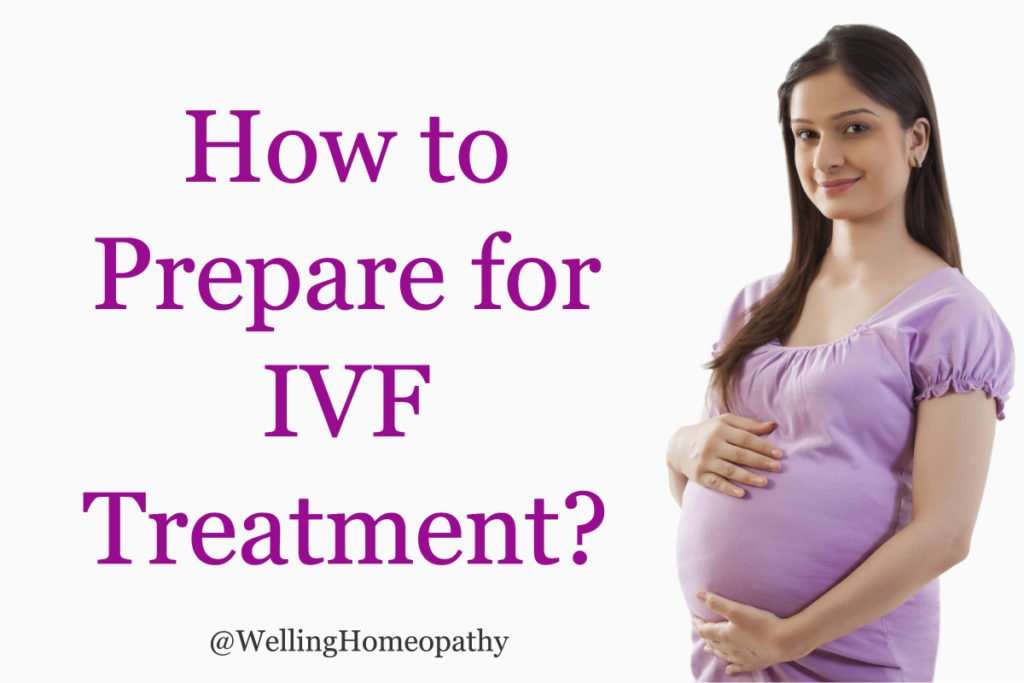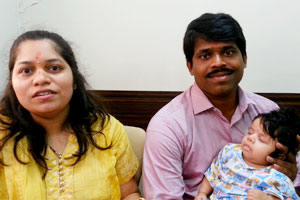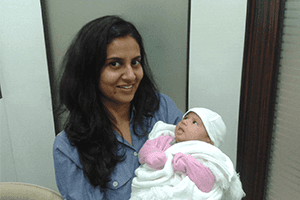The most common question a couple has from their infertility specialist is how to prepare for IVF treatment? Probably we are the best to answer this question, as we have helped couples conceive naturally over the last 18 years. We have seen depressed faces of parents who tried IVF and failed multiple times before opting for our natural, Homeopathy Assisted Reproduction Therapy.
We can surely help you go through the process of IVF successfully if you have decided 100% to go for IVF treatment instead of conceiving naturally through our highly successful Homeopathy Assisted Reproduction Therapy ( HART ).
If you wish to discuss natural conception before you prepare for IVF treatment, Call +91 8080 850 950 to book an appointment or to consult and order online. Consult our specialists today for a detailed evaluation and to start your customized Homeopathy medicines to conceive naturally.
How to Prepare for IVF Treatment
 Initially 2 to 4 weeks before the start of treatment, you will be asked to have a blood test. This is called an initial screening or initial assessment. It checks your immune system and also measures how well your body can cope with the drugs used in infertility treatments. You may need to take other tests too, depending on what type of treatment you are having. The first step is usually to see if there is any blockage in your fallopian tubes. If this is found then further investigations will be carried out to find out why. For example, if there is no obvious reason why you cannot get pregnant, then it could be that your eggs are not getting into the right place. A laparoscopy is often done at this stage. During this operation, doctors look inside your abdomen using a tiny camera attached to a light source. They can see whether there is anything blocking your fallopian tube or ovary. If they do find something, then they remove it. This is known as tubal sterilisation. If they don’t find anything, then we will try some more tests.
Initially 2 to 4 weeks before the start of treatment, you will be asked to have a blood test. This is called an initial screening or initial assessment. It checks your immune system and also measures how well your body can cope with the drugs used in infertility treatments. You may need to take other tests too, depending on what type of treatment you are having. The first step is usually to see if there is any blockage in your fallopian tubes. If this is found then further investigations will be carried out to find out why. For example, if there is no obvious reason why you cannot get pregnant, then it could be that your eggs are not getting into the right place. A laparoscopy is often done at this stage. During this operation, doctors look inside your abdomen using a tiny camera attached to a light source. They can see whether there is anything blocking your fallopian tube or ovary. If they do find something, then they remove it. This is known as tubal sterilisation. If they don’t find anything, then we will try some more tests.
These include:
• Fertility testing – We will check your hormone levels and sperm count.
• Ultrasound scan – An ultrasound scan uses sound waves to create images of organs like the womb and ovaries. Doctors use these scans to see if there are problems with your reproductive organs.
• Laparoscopic surgery – This involves inserting a thin telescope through small cuts made in the skin. Using this, doctors can see inside your abdominal cavity.
• Hysterosalpingogram – This is a procedure where dye is injected into your cervix to help doctors see if there is any blockage in your uterus.
If all these tests come back clear, then you will go ahead with the next steps.
The second phase of preparation begins about one week before the actual day of egg collection. At this point, you will be given medication to stimulate your ovaries. This is normally started around 5 days after the previous period has ended. Your doctor will tell you when to expect the next period so you know when to stop taking the tablets.
The third step is starting the process of egg retrieval. This is usually performed by injecting anaesthetic directly into the follicles in your ovaries. These follicles contain immature eggs which are ready to develop. Once the anaesthesia takes effect, your doctor will insert a needle into each follicle. He/she will extract the eggs from the follicles. These eggs are then taken to the laboratory for fertilization.
Once the eggs are fertilised they are returned to your ovaries. There they remain until implantation.
You will be told exactly when to take your fertility pills again. These should be taken every day for 3 months. After this time, you will be able to conceive naturally without medical intervention.
IVF Success Rates
In vitro fertilisation, success rates vary greatly between clinics and countries. In Australia, the average rate is around 30%. However, the success rate varies widely depending on the age of the woman, her health status and the quality of the eggs she produces.
You can read here about IVF success rate and why they are so low
For women under 35 years old, the chance of pregnancy following IVF is 50% or higher. For older women, the chances of successful conception drop significantly.
Successful pregnancies are most likely to occur when the woman is less than 40 years old. Women over 40 generally have lower success rates.
There are many factors that affect the likelihood of achieving a successful pregnancy.
• Age of the woman
• Number of oocytes retrieved
• Quality of the embryos created
• Health of the mother
• Size of the uterine lining
• Degree of endometrial receptivity
• Timing of embryo transfer
• Type of stimulation protocol used • Use of donor eggs
• Genetic abnormalities in the embryos
• Embryo freezing
• Miscarriage risk
• Fertility drugs used during treatment
• Duration of infertility
• Cause of infertility
• Previous treatments
• Surgical history
• Body mass index
• Smoking habits
• Ethnicity
• Hormone levels
• Blood group
• Antenatal screening results
• Family history of genetic disease
• History of ectopic pregnancy
• Endocrine disorders
• Thyroid function
• Ovarian reserve
• Uterine cavity size
• Vaginal bleeding
• Menstrual cycle length
• Luteinizing hormone levels
• Progesterone levels
• Baseline blood pressure
• Physical activity level
• Stress levels
• Diet
• Alcohol consumption
• Drug use
• Exercise
• Weight gain
• Weight loss
• Sleep patterns
• Sexual activity
Taking Care Of Stress Before & During the IVF Process
Stress can have a negative impact on your health, fertility and chances of success with IVF. It is important to manage stress before and during the IVF process so that you are able to focus on the most important thing – getting pregnant!
Here are some tips to help you reduce your stress levels:
Learn how to relax. Find time each day to do something relaxing such as listening to music, reading a book, going for a walk or doing yoga.
Take regular breaks throughout the day. Try not to work for more than eight hours at one time. If possible, try to get up and move about once an hour.
Get enough sleep. Make sure you are sleeping at least seven hours per night.
Eat well. Avoid eating too much junk food and drinking alcohol.
Keep yourself hydrated. Drink plenty of water.
Be positive. Think positively and believe that everything will turn out fine.
Take care of yourself. Do things that make you feel good. This could be spending time with friends and family, taking walks, playing sports or even just having fun.
If you are experiencing anxiety, depression or other emotional problems, talk to your doctor or nurse. They may be able to recommend ways to deal with these issues.
Things You Must Do To Make Successful IVF Pregnancy
After trying to conceive for several months without success, it’s time to start preparing your body for pregnancy.
The first step is to prepare your body by stopping all birth control pills and using natural methods of contraception such as condoms.
You should also stop smoking because this can cause miscarriage and premature delivery.
Your next step is to schedule a visit to your gynecologist/obstetrician to discuss your options for conception. You can choose between ovulation induction or intrauterine insemination.
Ovulation Induction
This involves taking fertility medication to stimulate the release of multiple mature eggs from each ovary. The eggs then travel through the fallopian tubes into the uterus where fertilization occurs.
Intrauterine Insemination
This method involves placing sperm directly into the uterine cavity.
Both methods require three visits to the clinic over a period of 3-4 weeks.
During the first visit, your doctor will perform a physical exam and collect samples of your cervical mucus, urine and blood. He or she will check your hormone levels and determine if you are ovulating normally.
During the second visit, your doctor will inject hormones into your vagina to trigger ovulation.
During the third visit, your doctor will insert a special catheter into your cervix to retrieve the egg and place them into a small tube called an embryo transfer catheter.
He or she will then gently remove the ET catheter from your determine cervix.
Once the procedure has been completed, your doctor will give you instructions if you are ovulating normally.
During the second visit, your doctor will insert a thin tube called an endometrial pipelle into your vagina. This allows him or
her to inject a small amount of fluid containing hormones into your uterus.
During the third visit, he or she will remove the pipelle and place two tiny needles into your cervix. These allow him or her to extract eggs from your ovaries and transfer them into the uterus. At the same time, he or she will inject another small dose of hormones into your uterus. This causes the lining of your uterus to grow thickly so that when the eggs reach there they will implant themselves.
In most cases, the process takes about 7 days. If you have trouble getting pregnant after 6 months of trying, your doctor may suggest additional treatments.
For example, some women who experience infertility due to poor quality eggs may benefit from ovarian stimulation. Ovarian stimulation involves injecting hormones into the ovaries to increase the production of eggs.
If you have had one or more miscarriages, your doctor may recommend artificial insemination with donor semen. Donor sperm contains no genetic defects and therefore cannot pass on any diseases.
Artificial insemination with donor semen requires only 2 visits to the clinic. He or she will check your hormone levels and determine During the first visit, your doctor will inject hormones into your vagina to trigger ovulation. Then during the second visit, he or she will insert a special catheter into your cervix to retrieve the egg and place it into a small tube called an embryo transfer catheter.
The doctor will then gently remove the ET catheter from your cervix. Once the procedure is complete, your doctor will give you instructions if you are ovulating normally. This allows him or her to inject a small amount of fluid containing hormones into your uterus.
These allow him or her to extract eggs from your ovaries and transfer them into Donor sperm contains no genetic defects This process usually takes about 7 days. If you have had one or more miscarriages, your doctor may recommend artificial insemination with donor semen.
Difference between IVF and IUI, Surrogacy
IVF stands for In Vitro Fertilization. It is also known as Assisted Reproductive Technology. It involves taking eggs from one woman and combining them with sperm from another man outside of her body. Then these two cells are put back into the woman’s uterus where they will grow into embryos that can become babies.
This process is called “In vitro” because it takes place outside of the woman’s body.
IUI stands for Intrauterine Insemination. It is also known as Natural Family Planning. It involves putting sperm directly into the woman’s uterus through a catheter. The idea is that this stimulates the release of eggs from the woman’s ovaries.
Surrogacy is a type of assisted reproduction that occurs when a couple uses a surrogate mother to carry their child.
Balance your diet.
And all of these are unhealthy during or before pregnancy. Eat healthy food that contains less sugar, salt, fat, and cholesterol. Avoid junk foods and eat more fruits and vegetables. Eat plenty of protein-rich foods like fish, chicken, lean meat, beans, nuts, seeds, etc.
Avoid alcohol and drugs.
Alcohol and drug use can cause infertility. Alcoholic beverages contain high amounts of acetaldehyde, a chemical compound that damages DNA. It also causes liver damage. Drugs such as cocaine, heroin, marijuana, amphetamines, and other stimulants can prevent sperm from moving properly.
Get enough sleep.
Sleep deprivation has been linked to fertility problems. Women who get fewer than 6 hours of sleep each night are at risk for having difficulty getting pregnant.
Exercise regularly.
Regular exercise improves circulation and boosts energy levels. Exercise helps maintain a normal weight and reduces stress. It also increases blood flow to the reproductive organs.
Talk to your doctor.
Your doctor should be able to help you find out what caused your infertility problem. He or she might suggest tests such as:
A Pap smear test.
An ultrasound.
Chromosome analysis.
If you don’t know why you’re infertile, ask your doctor to order a laparoscopy. A laparoscopy is a surgical procedure that lets your doctor look inside your abdomen.
Ask your doctor about medications that can affect your ability to conceive. These include antidepressants, antihypertensives, birth control pills, and certain antibiotics.
Ask your doctor if there are any alternative treatments available for you. There are many natural remedies that can improve your chances of conceiving. For example, you can take herbal supplements and vitamins to boost your immune system. You can also try acupuncture, hypnosis, yoga, meditation, and relaxation techniques.
You can also talk to your friends and family members about how they were conceived. They may have some suggestions that could work for you.
Vitamins Before IVF
And all of these are unhealthy during or before pregnancy. Do not forget to take supplements
You need to take certain vitamins and minerals to ensure the proper functioning of your body. Vitamins like folic acid, vitamin B12, iron, zinc, calcium, magnesium, copper, etc., help in the development of the fetus. Iron deficiency can lead to low birth weight babies. Magnesium helps in maintaining a normal heartbeat. Vitamin D aids in bone formation and also protects against rickets. Zinc is essential for growth and immunity. Calcium helps in building strong bones. Copper is needed for red blood cells to carry oxygen throughout the body.
Eat Healthy Food That Contains Less Sugar, Salt, Fat And Cholesterol.
Magnesium is an important mineral for women’s health. It is required for the production of progesterone, which plays a vital role in preparing the uterus for implantation of the fertilized egg. The amount of magnesium in our diet depends on the type of food we consume. Foods rich in magnesium include whole grains, legumes, leafy green vegetables, nuts, seeds, tofu, and milk products.
Calcium is another nutrient that is very important for women’s health. It is necessary for the healthy function of the heart, muscles, nerves, and other tissues. Calcium is found in dairy products, dark-green leafy vegetables, fish, beans, and almonds.
Iron is another important nutrient for women’s health. It is used by the body to make hemoglobin, which carries oxygen from the lungs to the rest of the body. Iron is present in meat, poultry, eggs, dried fruits, and fortified cereals.
Zinc is one of the most important nutrients for pregnant women. It is involved in cell division and DNA synthesis. It is also required for the normal functioning of the immune system. Zinc is found in oysters, beef, pork, chicken, lamb, turkey, tuna, cheese, wheat germ, brewer’s yeast, and liver.
Vitamin C is also very important for women’s health. It is needed for collagen formation, wound healing, and maintenance of teeth and gums. Vitamin C is found in citrus fruits, broccoli , bell peppers, strawberries, kiwi fruit, tomatoes, cantaloupe, and cauliflower.
Diet During Pregnancy
Women who are planning to conceive should avoid eating large amounts of sugar and salt. These foods cause water retention, which makes it difficult for the baby to grow properly. Women with diabetes should be careful when consuming sweets because high levels of glucose in their bloodstream increase the risk of miscarriage.
Women who are trying to get pregnant should eat plenty of fresh fruit and vegetables. They contain lots of fiber, which helps prevent constipation and hemorrhoids. Fiber also helps regulate bowel movements, making them easier to pass. Fruits and vegetables are also good sources of potassium, which helps maintain fluid balance and muscle contraction. Potassium is also important for nerve conduction.
Pregnant women should limit their intake of alcohol. Alcohol increases the risk of miscarriage.
Exercise During Pregnancy
During pregnancy, exercise has been shown to improve mood and reduce stress. Exercise also improves sleep patterns and reduces fatigue.
During early pregnancy, moderate aerobic activity such as walking or swimming may be beneficial. As you approach the third trimester, vigorous activities such as jogging or cycling are recommended.
In the last few weeks before delivery, gentle stretching exercises can help prepare the mother for labor. However, strenuous exercise should be avoided during this time.
Maintaining Good Nutrition Habits After Pregnancy
After giving birth, many mothers find themselves struggling with postpartum weight gain. This is due to a combination of hormonal changes and increased appetite. If you have gained too much weight after having your baby, talk to your doctor about ways to lose the extra pounds.
If you have not yet had a child, you might want to start thinking about getting pregnant. In order to do so, you need to take care of yourself first. Make sure you eat well, drink enough water, and get regular checkups. You will be better able to handle any problems that arise if you are healthy.
20 Things You Need to Do Before Starting IVF
If you’re considering starting an in vitro fertilization cycle, there are a few things you need to do before you begin. Here are nine of the most important:
IMPORTANT – If you are sure about going in for hormonal IVF treatment instead of conceiving naturally with our Homeopathy Assisted Reproduction Therapy ( HART ) I would suggest starting our pre-IVF treatment, 1-3 months before going in for IVF, as the chances of IVF increase more than 20% if your reproductive organs are working to their optimum with our Homeopathy medicines, specially formulated to help you carry your pregnancy successfully.
1. Get tested for diabetes and blood pressure. If you have been diagnosed with pre-diabetes or diabetes, you should be treated as well. This is because diabetes can cause infertility and even miscarriage. A simple test will tell you if you have any of these conditions.
2. Find out what kind of treatment you will receive at each stage of your fertility journey. Some clinics offer only egg donation; others offer both eggs and sperm. At other times, they provide only embryo transfer. The type of treatment you receive depends on a number of factors, including how far along you are in your menstrual cycles and whether you have any medical issues.
3. Decide whether you want to use donor eggs or donor sperm. Donor eggs and donor sperm are two different types of assisted reproductive technology. Each option comes with its own set of advantages and disadvantages. For example, using donor eggs means you don’t have to worry about passing on genetic disorders. On the flip side, it takes longer to conceive than when you use your own eggs. Using donor sperm means you don’t have to worry about passing on genetic disorders. However, it can be more expensive.
4. Consider taking medication to stimulate ovulation.When you undergo fertility treatments, your body produces fewer eggs than usual. To make up for this, doctors sometimes prescribe medications that stimulate ovulation. These drugs include clomiphene citrate and gonadotropin-releasing hormone.
5. Choose a clinic that offers the best possible outcomes. There are many factors to consider when choosing a fertility clinic. For instance, you want to choose a facility where staff members are friendly and professional. They should also be knowledgeable about all aspects of fertility treatments, from conception to pregnancy.
6. Ask about insurance coverage. Many fertility clinics accept health insurance plans. It’s a good idea to ask your insurance company about their policies regarding fertility treatments.
7. Check out the clinic’s success rate. When you visit a clinic, you want to know how successful it has been in helping people like you become parents. Look into the clinic’s success rates by reviewing online reviews
8. Learn everything you can about the procedure itself. Fertility treatments involve several steps. First, you must prepare for the procedure. Second, you will have injections of hormones to induce ovulation. Third, you will either collect your own eggs or use donor eggs. Fourth, you will have your eggs fertilized and then transferred to your uterus. Fifth, you will carry the baby until he or she is born. Finally, you will give birth to your baby.
9. Think about your lifestyle before going through fertility treatments. You may need to change your diet, exercise program, sleep schedule, or daily routine.
10. Be open-minded about the process. As you go through fertility treatments, you may feel frustrated, anxious, or depressed. But remember that every step you take toward parenthood brings you closer to becoming a parent.
11. Keep track of your progress. After undergoing fertility treatments, you may not see results right away. In fact, you might not even realize that you’ve conceived. So keep track of your progress by keeping a journal. This way, you can document your experiences as you move through the various stages of infertility treatments.
12. Talk to family and friends who have gone through similar processes. Having someone else share your experience can help ease some of the stress associated with fertility treatments.
13. Take time off work. If you’re working full-time, you may want to take time off so you can focus on your treatment plan.
14. Find support groups. Support groups provide an opportunity to meet other couples who are experiencing infertility. The group helps them cope with the challenges they face.
15. Get plenty of rest. During fertility treatments, you may find yourself feeling exhausted. That’s because you’ll likely be awake at night while you wait for your period to return.
16. Avoid caffeine. Caffeine interferes with your ability to get pregnant. So if you drink coffee or tea, limit your intake to one cup per day.
17. Stay hydrated. Your body needs water to function properly. So stay well-hydrated during fertility treatments.
18. Don’t smoke. Smoking decreases fertility and increases the risk of miscarriage.
19. Eat healthy foods. A nutritious diet can boost your chances of conceiving. So make sure you eat lots of fruits and vegetables. Also include lean meats, whole grains, low-fat dairy products, and fish.
20. Follow a regular exercise regimen. Exercise boosts your energy level and improves your overall health. It also stimulates the release of certain hormones that promote pregnancy.
Patience and Persistence Can Help You
IVF Understand that it takes time to conceive. Even though you may be able to detect signs of ovulation, it could still take several months to conceive.
Realize that you won’t always know when you’re pregnant. Some women don’t show any signs of being pregnant until their third trimester.
Know that you may have to try again. If you don’t become pregnant after three cycles of in vitro fertilization, then you should consider having another round of IVF.
The information contained on this page is not intended to serve as medical advice nor does it replace the need to consult a doctor regarding any matter involving the human body. It merely provides general information related to the subject covered.
Call +91 8080 850 950 to book an appointment or to consult and order online. Consult our specialists today for a detailed evaluation and to start your customized Homeopathy medicines to conceive naturally.
You can also meet our specialist to know more about how to prepare for IVF Treatment?







